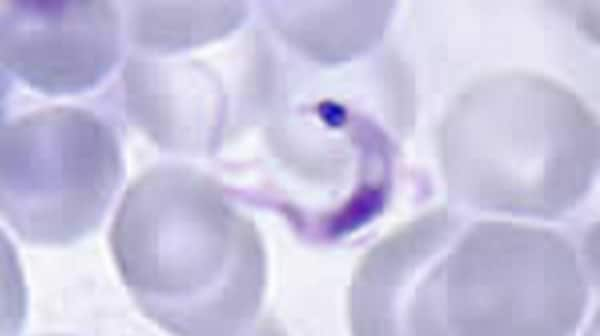Key points
- Acute Chagas disease can be identified by spotting parasites in blood using microscopy.
- For chronic Chagas, look for specific antibodies against the parasite.
- Since 2006, FDA has approved tests for screening blood donations for specific antibodies against the T. cruzi parasite.
Diagnosis
In the acute phase of infection, healthcare providers might observe parasites circulating in the blood. They can diagnose Chagas disease by detecting these parasites in a blood smear through microscopic examination. This involves preparing and staining both thick and thin blood smears to visualize the parasites.
To diagnose chronic Chagas disease, healthcare providers should assess the patient's clinical findings and infection likelihood, including factors like a history of residence in a Chagas-prevalent area. Typically, this diagnosis requires testing for parasite-specific antibodies.

Diagnosing acute infections
- Diagnose acute infections by identifying trypomastigotes in blood using microscopy.
- Parasite levels in the blood decrease rapidly within a few months and become undetectable by most diagnostic methods during the chronic phase.
Diagnosing chronic Chagas disease
- For chronic Chagas disease, use serologic tests to detect antibodies against the parasite.
Testing protocol
- No single test is sufficiently sensitive and specific for diagnosis.
- Use two or more tests that detect antibodies to different antigens.
- Common techniques include enzyme-linked immunosorbent assay (ELISA) and immunofluorescent antibody test (IFA).
- Assessing the patient's history for infection risks is also helpful.
Screening blood donations
There are FDA-approved screening and supplemental or confirmatory tests that screen blood donations for serologic evidence of Trypanosoma cruzi infection. Donors who are positive on the screening test and the supplemental test can no longer donate blood, regardless of any additional testing result. Donors who test positive should contact their healthcare provider. Blood donor screening tests are not appropriate for clinical diagnostic purposes and additional testing is indicated.
In 2017, FDA issued new guidance about how donors who tested false positive on a screening test can be evaluated to see if they are eligible to donate blood again. Donors who have discordant test results should contact the blood bank regarding this evaluation.
Requesting assistance from CDC
For questions regarding diagnostic considerations, contact CDC's Parasitic Diseases Inquiries (404-718-4745; e-mail chagas@cdc.gov).
